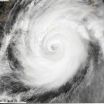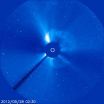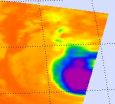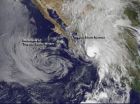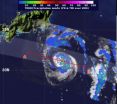(Press-News.org) Super Typhoon Jelawat is a large and powerful storm that has been bringing very rough seas to areas in the western North Pacific. NASA's Terra satellite passed over the monster storm and captured a visible image as it nears the big island of Japan.
NASA's Terra satellite passed over Super Typhoon Jelawat on Sept. 28 at 0238UTC (10:38 p.m. EDT, Sept. 27) and the Moderate Resolution Imaging Spectroradiometer captured an infrared image as the storm approaches Okinawa, Japan.
Jelawat's center passed by Ishigaki-jima by 1500 UTC (11 a.m. EDT) on Sept. 28 and was approaching Okinawa, the island that houses Kadena Air Base. Ishigaki is a Japanese island, located west of Okinawa and is the second-largest in islands known as Yaeyama Island group.
On Sept. 28 at 1500 UTC (11 a.m. EDT) Jelawat had maximum sustained winds near 110 knots (126.6 mph/203.7 kmh). That makes Jelawat a category three typhoon on the Saffir-Simpson scale. Jelawat was located near 24.6 North latitude and 125.6 East longitude, about 190 nautical miles (218.6 miles/352 km) southwest of Kadena Air Base, Okinawa. It is moving to the northeast at 10 knots (11.5 mph/18.5 kmh) and generating very rough seas, with waves as high as 40 feet (12.1 meters).
The center of Jelawat is expected to pass near or over Okinawa. The Facebook page for Kadena Air Base noted that the base is at warning level TCCOR-1 which means "Destructive sustained winds of 50 knots or greater are expected within 12 hours (or within four hours as of 2 p.m. EDT on Sept. 28)."
By Sept. 30, Jelawat is expected to be tracking off-shore from Japan's big island as it continues moving to the northeast in open waters
INFORMATION:
NASA sees super Typhoon Jelawat Affecting Japan
2012-09-29
ELSE PRESS RELEASES FROM THIS DATE:
NASA sees sun unleash a wide, but benign, CME
2012-09-29
The sun erupted with a wide, Earth-directed coronal mass ejection (CME) on Sept. 27, 2012 at 10:25 p.m. EDT. CMEs are a phenomenon that can send billions of tons of solar particles into space that can reach Earth one to three days later, affecting electronic systems in satellites and on the ground. Experimental NASA research models estimate that the CME is traveling at around 700 miles per second and will reach Earth on Sept. 29.
CMEs of these speeds are usually benign. In the past, similar CMEs have caused auroras near the poles but have not caused disruption to electrical ...
NASA sees stubborn Nadine intensify into a hurricane again
2012-09-29
Infrared data from NASA's Aqua satellite today, Sept. 28, revealed strong convection and thunderstorms have built up again in Tropical Storm Nadine as it moved over warm waters in the Eastern Atlantic Ocean. That convection strengthened Nadine back into a hurricane today. Nadine has lasted over two weeks, but is nowhere near breaking the record for longest-lived tropical cyclone.
NASA's Aqua satellite passed over long-lived Nadine on Sept. 28 at 0441 UTC (12:41 a.m. EDT) when it was still a tropical storm and the Atmospheric Infrared Sounder (AIRS) instrument captured ...
NASA sees Tropical Storm Miriam takes final bow, replaced by Norman
2012-09-29
The National Hurricane Center issued their last advisory on Miriam on Sept. 27 at 11 p.m. EDT when it became a remnant low pressure area. At that time, the center of post-tropical cyclone Miriam was located near latitude 22.0 north and longitude 116.7 west, just over 400 miles west of the southern tip of Baja California. Miriam had maximum sustained winds near 30 knots (35 mph/55 kmh).
NOAA's GOES-15 satellite captured an infrared image of Tropical Storm Miriam and a developing low pressure area in the Eastern Pacific on Sept. 28 at 1145 UTC (7:45 a.m. EDT), off the coast ...
NASA sees many things happening in Tropical Storm Ewiniar
2012-09-29
There are a number of things happening under the hood of Tropical Storm Ewiniar's clouds that have been deciphered by satellite data today, Sept. 28, 2012, and NASA's TRMM satellite has noticed one area of heavy rainfall remaining.
NASA's Tropical Rainfall Measuring Mission (TRMM) satellite noticed light to moderate rainfall around most of the tropical storm, with the heaviest rainfall east of the center of circulation. Rainfall in that area was falling at a rate of 2 inches (50 mm) per hour).
Tropical Storm Ewiniar has a partially exposed low-level circulation center, ...
Notre Dame researchers part of team that discovered potentially dangerous new malaria mosquito
2012-09-29
University of Notre Dame entomologists are part of a team of researchers that recently discovered a potentially dangerous new malaria-transmitting mosquito. The as yet unnamed, and previously unreported, mosquito breeds in the western areas of Kenya and has an unknown DNA match to any of the existing malaria-transmitting species.
The Anopheles species of mosquitoes which transmits malaria in Africa is already widely studied by researchers. It prefers to rest indoors during the day and feed on humans during the night. Current malaria control programs, including spraying ...
Notre Dame receives $6.1 million NSF grant award to advance Quarknet Program
2012-09-29
The University of Notre Dame has received a five-year, $6.1 million award from the National Science Foundation to support the continuation of the nationwide QuarkNet program, which uses particle physics experiments to inspire students and provide valuable research, training and mentorship opportunities for high school teachers.
Through the QuarkNet program, physicists at Notre Dame, Fermilab and 50 other research institutions will continue to mentor teachers in research experiences, enabling them to teach the basic concepts of introductory physics in a context that high ...
Patient selection for bilateral total knee replacement needs improvement
2012-09-29
Because there are more risks with having a total knee replacement in both legs at the same time than having a knee replacement in one leg, doctors in recent years have been selecting younger and healthier patients for the bilateral procedure. Now a new study by researchers at Hospital for Special Surgery has revealed that although patients are younger and healthier than those undergoing only one-sided surgery, they are becoming sicker and some complication rates have risen.
"Although we are selecting younger people, we can't ignore the fact that the population in general ...
Moffitt Cancer Center researcher helps develop prostate cancer testing, treatment guidelines
2012-09-29
Julio M. Pow-Sang, M.D., chair of Moffitt Cancer Center's Department of Genitourinary Oncology, and colleagues have published two prostate cancer articles in the September issue of JNCCN – The Journal of the National Comprehensive Cancer Network. The articles review and clarify recent updates made to the National Comprehensive Cancer Network's (NCCN) guidelines for the screening and treatment of prostate cancer.
According to the NCCN, nearly 242,000 cases of prostate cancer will be diagnosed in 2012, accounting for 29 percent of new cancers among men. It is estimated ...
Lack of sleep leads to insulin resistance in teens
2012-09-29
Darien, IL - A new study suggests that increasing the amount of sleep that teenagers get could improve their insulin resistance and prevent the future onset of diabetes.
"High levels of insulin resistance can lead to the development of diabetes," said lead author Karen Matthews, PhD, of the University of Pittsburgh Department of Psychiatry. "We found that if teens that normally get six hours of sleep per night get one extra hour of sleep, they would improve insulin resistance by 9 percent."
The study, appearing in the October issue of the journal SLEEP, tracked the ...
NKSJ Holdings published Corporate Responsibility Communication 2012
2012-09-29
NKSJ Holdings, Inc. a joint company of Sompo Japan and Nipponkoa founded in April 2010, has released its Corporate Responsibility Communication 2012. The purpose to publish this report is to engage with our stakeholders both globally and locally in a more proactive way, to create synergy between affiliated companies and integrate CSR at the highest levels to the entire group.
To see the full CSR report, please visit:
http://www.nksj-hd.com/en/csr/communications/
Highlights in this yearfs report include:
1. Specifying NKSJ Groupfs New Five CSR Material Issues ...
